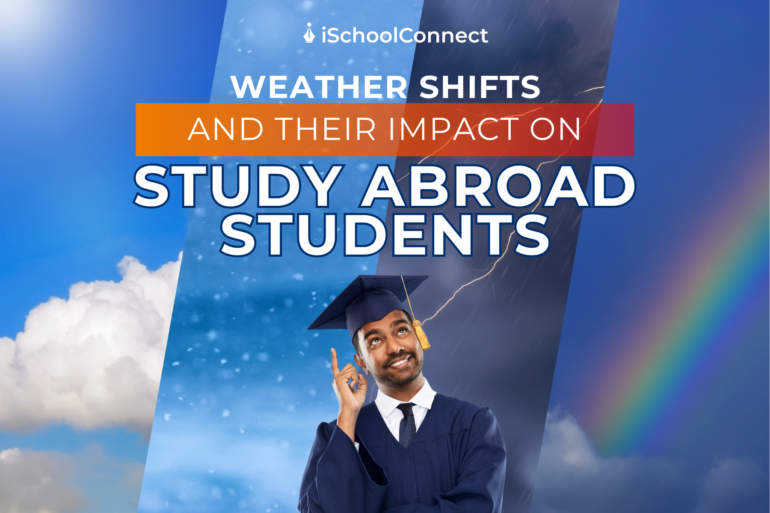Table of Contents
Weather variations and academic success for overseas students
Getting used to weather variations poses a considerable challenge for many overseas students, and the impact of severe weather extends beyond mere inconvenience. It affects various facets of life, including academic pursuits. Understanding how weather variations can impact learning abroad is crucial for students to navigate their academic journeys successfully. In this blog, we will discuss weather effects and practical coping mechanisms to help students adapt and thrive in diverse climatic conditions.
Extreme weather affects learning
Whether it’s scorching heat, bitter cold, heavy rainfall, or snowstorms, extreme weather conditions can significantly impact a student’s ability to focus and concentrate on their studies. Unfamiliar weather patterns can be distracting and uncomfortable, making it essential for students to find effective ways to cope. Extreme weather effects may disrupt transportation systems, leading to potential delays or cancellations of classes and exams.
Appropriate dressing
One of the first and most practical steps in dealing with changes in weather while studying abroad is to dress appropriately. Understanding the local climate and having the right clothing is crucial for staying comfortable and healthy. For instance, investing in quality winter clothing, including insulated jackets, boots, and accessories, is essential in colder regions. Lightweight and breathable fabrics in hotter climates can help students stay cool and avoid heat-related issues.
Preparation and planning

Being proactive in preparing for different weather effects is essential for a smooth academic experience abroad. Before departure, research the local climate and pack accordingly. Consider investing in weather-appropriate gear, such as umbrellas, raincoats, or sunscreen. Stay informed about weather forecasts and be aware of any extreme weather alerts. Planning your daily activities and staying prepared for sudden changes in weather conditions becomes easier with this information.
Health considerations
Changes in weather can have a direct impact on physical health. Exposure to extreme temperatures can lead to health issues, such as heatstroke, hypothermia, or respiratory problems. It’s crucial to prioritize health and take preventive measures. Stay hydrated, wear sunscreen, and seek medical attention if you experience any weather-related health concerns. Understanding the local healthcare system and having access to emergency services is vital for addressing health issues promptly.
To safeguard students’ health in cold weather, it is essential to prioritize layered clothing for adaptability to fluctuating temperatures. Emphasizing proper hydration, maintaining a nutritious diet, and protecting exposed skin with gloves, scarves, and hats are crucial practices. Encourage regular breaks indoors to mitigate prolonged exposure to cold conditions, particularly during outdoor activities. Students must engage in cold-weather exercises to warm up adequately and be mindful of signs of frostbite and hypothermia.
Mental health
Adapting to new weather effects and conditions can also take a toll on mental health. Seasonal affective disorder (SAD) is a type of depression that occurs at certain times of the year. It often happens in response to changes in daylight hours and weather patterns. To maintain good mental health while studying abroad, consider incorporating activities that boost mood and well-being. Engage in outdoor activities, practice mindfulness, and connect with support networks, both on and off campus.
Academic impact
Weather changes can have a direct impact on academic performance. Extreme weather events may lead to class cancellations, transportation disruptions, or power outages, affecting the regular academic schedule. To mitigate these challenges, establish open communication with professors and fellow students. Stay informed about contingency plans and be proactive in seeking alternative solutions for missed classes or assignments. Utilize online resources and virtual study groups to stay on track during weather-related disruptions.
The right approach to weather challenges in overseas education
In the pursuit of academic excellence abroad, navigating weather variations becomes an integral part of the student experience. Studying abroad is undeniably rewarding, but as we’ve explored, it comes with its unique set of challenges, particularly in adapting to diverse weather conditions. As overseas students strive for success, it is crucial to approach these challenges with a proactive mindset, thorough preparation, and a keen awareness of both physical and mental well-being.
The journey of studying abroad is a holistic experience that demands resilience, adaptability, and a proactive approach to weather-related challenges. By embracing these principles and implementing practical coping mechanisms, students can not only weather the storms, both literal and metaphorical, but also emerge from the experience with a wealth of knowledge, cultural understanding, and personal growth.
Key takeaways
- Understanding and researching the local climate before departure is crucial. Proactively invest in weather-appropriate clothing and gear to stay comfortable and healthy while studying abroad.
- Extreme weather can impact physical health. Prioritize hydration, wear sunscreen, and be aware of potential health concerns related to the weather.
- Navigating weather variations is an integral part of the holistic overseas education experience. Success requires resilience, adaptability, and a proactive mindset.
If you liked this blog and wish to explore more insights on studying abroad, share your thoughts in the comments below. Click here to reach out for additional information, and our dedicated team will gladly assist you with any queries you may have.
Liked this blog? Read next: Meteorology: The science of weather and climate changes
FAQs
Q1. Can I engage in outdoor activities during extreme weather, and how does it impact my overall well-being?
Ans- Engaging in outdoor activities is beneficial for mental well-being. While adapting to weather changes, find suitable outdoor activities that align with the climate, promoting both physical and mental health.
Q2. Is it common for academic institutions to provide guidance on dealing with weather variations for international students?
Ans- Yes, most academic institutions recognize the challenges posed by weather variations for international students. They often provide guidance, resources, and support to help students deal with these challenges successfully.
Q3. What is the best season to study abroad?
Ans- If you study abroad in the fall, you’ll have the opportunity to take advantage of the many festivals and winter markets that most cities abroad host in the fall. There’s also the extra advantage of taking a winter break trip after your semester concludes.






